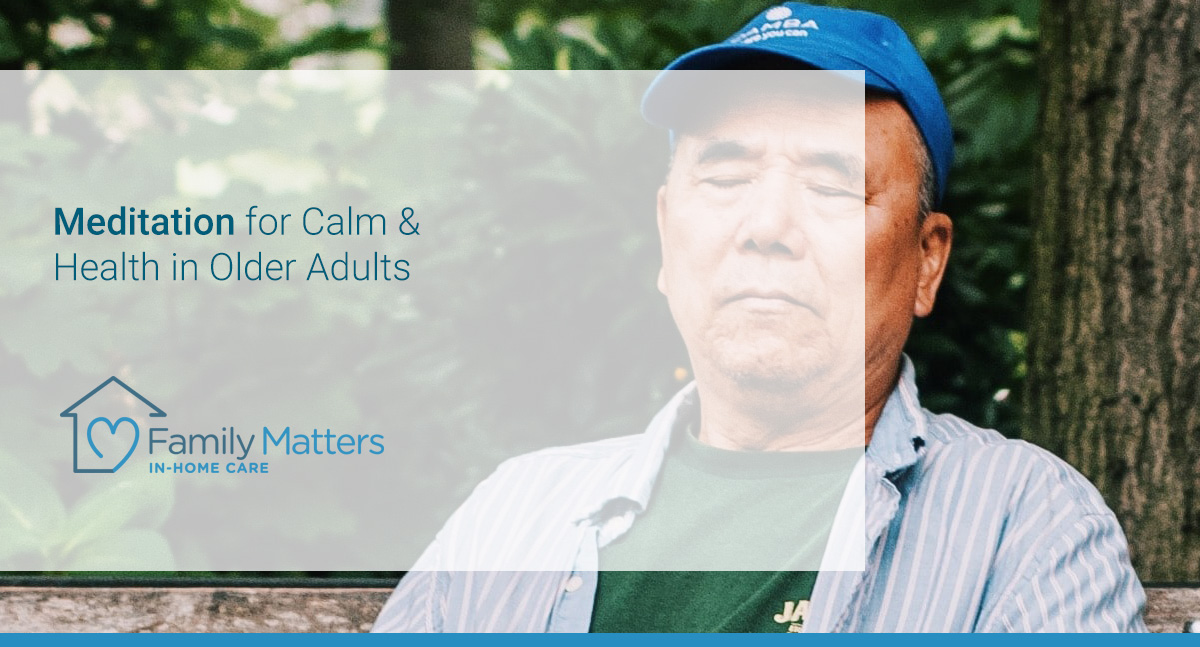
Meditation for Calm & Health in Older Adults
So much of the lives of our older adults are encompassed with medications and doctor’s visits. They are focused on the stresses of the future and the memories of the past. Meditation is an activity that helps them learn how to be them in the moment, costs nothing, and can bring enormous health benefits.
When a person meditates, their breath and heart rates slow, blood pressure decreases, and the stresses of the day get set aside. Meditation can promote better focus, increased calm, and improved sleep. In seniors experiencing early dementia, mindful meditation can help stimulate memories – both long and short term. Research has shown that mindful meditation can reduce pain and potentially slow the progression of Alzheimer’s.
Meditation Styles
As you start to research which meditation style will work for your loved one, there are several to look at:
Mindfulness
Mindfulness is the practice of just being in the moment without judgment of what that moment holds.
Guided Imagery
Guided Imagery focuses on calming mental images such as a beach, a favorite place, or person.
Body Scan
A Body Scan can be a useful tool to help our loved ones take account of where they are experiencing pain or discomfort on any given day. It is a practice where the meditator focuses on one body part at a time and notes how that body part is feeling in that moment. Your loved one may note such things as whether their foot, hand, arm, neck are hot or cold, tingling or calm, tense or loose.
Transcendental Meditation
Transcendental Meditation is the practice of focusing on a single word or sound that is repeated over and over to create a chant or mantra.
Metta
Metta is the loving-kindness meditation. It begins with developing kind thoughts and loving feelings inward. There are so many reasons for our loved ones to be disappointed with their failing health, mind, and bodies. This meditation restores for them a feeling of self-love. Once this has been mastered, it expands to encompass friends, family, acquaintances and, ultimately, people from whom they’ve become estranged.
If your senior is more mobile, there are meditation practices, such as tai chi, qigong or yoga, that combine the body and movement with breath and the silence of the mind. The slow and repetitive movements provide a similar mindfulness to the chants of Transcendental Meditation.
How to Start Meditation
Meditation is easy to start and forgiving in the process. It doesn’t seek perfection, only that the person practicing it keeps an open heart.
- Start with creating a regular time for the practice. Morning or midday are good times that allow the benefits to be felt through the rest of the day.
- Start with as few as 5 minutes and work towards a goal of 20 minutes a day. It doesn’t need to be the same amount of time each day.
- Meditation can be done sitting or lying down.
- Coach your loved one to take deep breaths from their diaphragm. The benefits of deep breathing include increased oxygen for their brain and blood.
- Focus on inhaling and exhaling as separate movements.
- Have your senior pay attention to any other physical sensations during the practice.
- While the focus should be on being in the moment, other thoughts that pop into their minds should be welcomed, acknowledged, and then allowed to move on without judgment.
- Some people are aided by using quiet music or nature sounds. Others prefer quiet. Some welcome a guided meditation where you (or a podcast, YouTube channel, or purchased meditation) quietly guide them through the above. Others prefer to sit and guide their thoughts on their own. There is no right or wrong.
- If you are choosing to guide your loved one through this process, remember to offer yourself the same acceptance and mindfulness that you are asking them to have. Take it slowly and don’t judge if it isn’t done perfectly.
As a caregiver for your loved one, you can also benefit from the calm, acceptance, and lowered stress of meditation. Consider setting aside a moment each day to either meditate while your loved one naps, or as a shared exercise with them. Studies have shown that only 8 weeks of regular practice create improvements in mental focus and decreased anxiety.
If you or your family member is considering in-home care as part of a plan to age in place, contact Family Matters In-Home Care today for a free consultation. Our team is dedicated to supporting your family and helping older adults enjoy life in the comfort of their own home for as long as possible.
Some of the services offered by Family Matter In-Home Care include: Alzheimer’s & Dementia Care, Bed & Wheelchair Transfer Assistance, Companionship, Housekeeping & Meal Preparation, Personal Care, Recovery Care, and Transportation.
Serving the San Francisco Bay Area and Greater San Diego, Family Matter In-Home Care has offices throughout California including: Campbell, CA, Roseville, CA, San Marcos, CA, and San Mateo, CA.
Sources:
- https://f.hubspotusercontent30.net/hubfs/1708580/0122%20Meditation.pdf
- https://www.seniorsmatter.com/the-benefits-of-mindful-meditation-for-older-adults-and-how-to-get-started/2491870/
- https://health.usnews.com/wellness/aging-well/articles/2018-06-22/the-many-benefits-of-meditation-for-older-adults
- https://www.healthline.com/nutrition/12-benefits-of-meditation
- https://www.multiculturalcaregiving.net/the-benefits-of-meditation-for-seniors-and-caregivers-a-surprisingly-accessible-and-powerful-technique/
